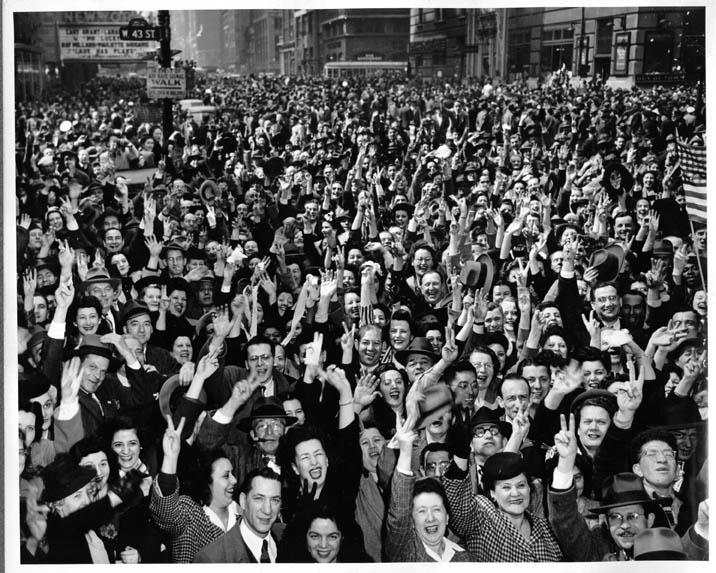May 8 (May 9 in Russia)
It’s been a while since the Europeans have really gone at each other, outside of a football match. Which is a good thing, because when they do go at it, they tend to bring the rest of the world with them.
Such was the case in 1939.
Following Germany’s invasion of Poland on September 1, 1939, Britain’s (and France’s) entry into the war on Poland’s behalf guaranteed that the Commonwealth would follow, including lands as distant as Canada, Australia, and India.
The territorial possessions of Britain, France, Germany, and Belgium in Africa ensured that the African continent too would become one vast battlefield.
And Germany’s alliance with Japan eventually drew the United States into the war in Asia and the Pacific. Even more than first, the second conflagration earned the title World War.

The tragedy of September 1, 1939 was matched only by the exuberance of May 8th, 1945. To this day, May 8th is remembered in much of Europe and the world as Victory Day, or Victory in Europe Day. [It was already May 9th in the Soviet Union by the time news of peace hit there.]
The Allies invaded German-occupied France on June 6, 1944, a date immortalized as D-Day. Paris was liberated on August 25 of that year. Allied forces pushed their way toward the German interior over the next seven months—the U.K., U.S., and France from the West, Russia from East. It wasn’t until April 30, 1945, with the Russians on the outskirts of Berlin, that the once-invincible Hitler committed suicide in a bunker in Berlin.
A week later, German General Alfred Jodl signed the “instrument of surrender”. The following day, May 8, the German government ratified the surrender, ending the brutal six-year war that had devastated Europe.

British Prime Minister Winston Churchill addressed his people with the following…
“The German war is therefore at an end. After years of intense preparation, Germany hurled herself on Poland at the beginning of September, 1939; and, in pursuance of our guarantee to Poland and in agreement with the French Republic, Great Britain, the British Empire and Commonwealth of Nations, declared war upon this foul aggression. After gallant France had been struck down we, from this Island and from our united Empire, maintained the struggle single-handed for a whole year until we were joined by the military might of Soviet Russia, and later by the overwhelming power and resources of the United States of America.
“Finally almost the whole world was combined against the evil-doers, who are now prostrate before us. Our gratitude to our splendid Allies goes forth from all our hearts in this Island and throughout the British Empire.
“We may allow ourselves a brief period of rejoicing; but let us not forget for a moment the toil and efforts that lie ahead…”
Winston Churchill, May 8, 1945
Churchill was referring not to the reconstruction of Britain and Europe—a task that would take over a decade and consume resources on a scale never before seen—but to the continuing war with Japan.
The war in the Pacific only came to a close after the detonation of two atomic bombs on a civilian population.
In 1945: The War that Never Ended, Gregor Dallas writes that:
“I personally do not know a single Frenchman who can remember the day the war officially ended in Europe. But they all remember D-Day. And their parents remember—often with tears in their eyes—the day the Great War ended, 11 November 1918…Despite all the propaganda, most Frenchmen did not consider 1945 a ‘victory’…
Dallas suggests, that despite remembrances and images of V-E Day celebrations, for the average person, be they in France, England, the United States or elsewhere, May 8 passed much as other days. The end of the war was a series of events, and ‘Victory Day’ was not as a defining a moment as history recalls…
“For the vast majority of Europeans, all this talk about VE-Days’, ‘VJ-Days’ and ‘V-Days’ was a matter of argument for politicians and, later, historians. The ‘day the war ended’ was the day the bombing stopped, the fighting ended, a loved one came home; or the day one realized the people one most cherished would never be seen again…” (Dallas)
The Day the War Ended: May 8, 1945, by Martin Gilbert
